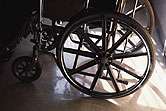Many U.S. subspecialty practices cannot accommodate patients with mobility impairment, according to a study published the March 19 issue of the Annals of Internal Medicine.
(HealthDay)—Many U.S. subspecialty practices cannot accommodate patients with mobility impairment, according to a study published in the March 19 issue of the Annals of Internal Medicine.
Tara Lagu, M.D., M.P.H., from Baystate Medical Center in Springfield, Mass., and colleagues conducted a telephone survey to try to make an appointment for a fictional obese and hemiparetic patient who used a wheelchair, and could not self-transfer from chair to examination table. To examine the accessibility of subspecialty practices in four U.S. cities, calls were made to 256 endocrinology, gynecology, orthopedic surgery, rheumatology, urology, ophthalmology, otolaryngology, and psychiatry practices.
The researchers found that 22 percent of the practices reported that they were unable to accommodate the patient. Specifically, 4 percent reported that the building was inaccessible while 18 percent reported being unable to transfer a patient from a wheelchair to an examination table. Height-adjusted tables or a lift were used for transfer by 9 percent of practices. The highest rate of inaccessible practices (44 percent) was seen in gynecology.
"Patients with mobility limitations may have difficulty accessing subspecialists, a finding that is related to issues of transferring from the wheelchair to an examination table rather than those of building accessibility," write the authors. "These results show the need for better awareness among providers about the requirements of the Americans with Disability Act and the standards of care for patients with mobility impairment."
More information:
Full Text (subscription or payment may be required)
Editorial (subscription or payment may be required)
Journal information: Annals of Internal Medicine
Health News Copyright © 2013 HealthDay. All rights reserved.





















